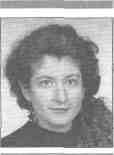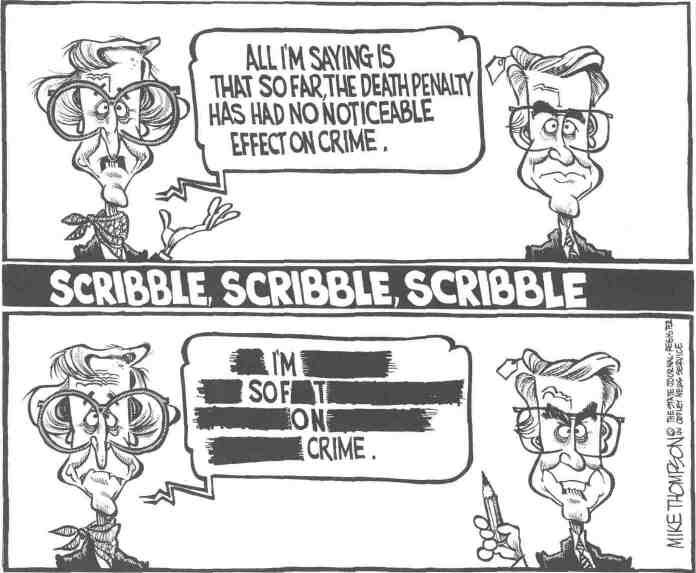 |
Home | Search | Browse | About IPO | Staff | Links |
 |
Home | Search | Browse | About IPO | Staff | Links |

By JENNIFER HALPERIN
| Edgar's opponent was honest and forthright about how she planned to begin addressing the tax system's inequities, and Edgar owed taxpayers an honest, thoughtful response. Instead, he didn't deliver |
In the 1968 film Rosemary's Baby, the protagonist's husband bargains with the devil to secure a job he wants — the starring role in a play.
In the 1994 Illinois governor's race, Gov. Jim Edgar made a bargain of his own as he sought to hang onto his role for another four years. He may not have been dealing with forces quite so sinister as those portrayed in the movie, but they didn't exactly represent wholesomeness and complete honesty either.
Edgar took a pass on talking about important issues so he could be assured of gliding back into the governor's office for another term. He issued vacuous and misleading charges against opponent Dawn dark Netsch in return for an early and hefty lead in the polls. It is not a strategy in which he or his handlers should take pride.
Ironically, poll results from the governor's race showed it was not a strategy that was even necessary. From the size of Edgar's victory margin, it's pretty clear he still would have won re-election even if he had engaged in an honest discussion and debate of the issues instead of dodging them.
Take, for instance, the matter of restructuring the state's tax system. While not the wisest campaign device, this was the heart of Dawn dark Netsch's tax plan. It wasn't just a 42 percent income tax hike, as Edgar and his handlers drummed into voters' heads. It was a formula that would have put more money into education and would have provided property tax relief.
Netsch's failure to communicate this effectively is her own fault. She allowed the Edgar campaign to define her as some kind of tax-crazed fiend without preparing much of a defense that could resonate with the voters.
But Edgar shouldn't be let off the hook either. He has admitted in the past that Illinois' tax system needs to be overhauled, and this year's gubernatorial campaign was the perfect forum to discuss such ideas. His opponent was honest and forthright about how she planned to begin addressing the system's inequities, and Edgar owed taxpayers an honest, thoughtful response. Instead, he didn't deliver.
Edgar didn't want to discuss it during the campaign, but he has supported an income tax increase in the past as a way to correct unfair tax burdens. (See October 1994 Illinois Issues.) Doug Whitley, who served as Edgar's revenue director for nearly two years, remembers Edgar staking out territory during his first campaign for governor that was similar to Netsch's stand this time. Back then, Edgar said the temporary income tax surcharge set to expire in 1991 should be made permanent — a position that his opponents in the primary and general elections used against him.
Early on in that first run at the governor's mansion, he reminded voters of a proposal he'd made years earlier while serving in the General Assembly: He had introduced legislation to allow school districts at the local level to adopt an income tax by referendum as a way to ease property taxes.
When asked about such ideas during the most recent campaign, Edgar dismissed them as the naive musings of a neophyte legislator. After all, he served in the legislature more than 15 years ago That he was still bringing up these ideas four years ago shows that he knows tax reform is a legitimate issue — crucial, in fact — and deserving of more attention than he gave it this campaign. All over the country, voters have complained about the use of sound bites and the absence of true discourse during campaigns. So Edgar squandered a chance to give people what they say they want.
Crime was another area where Edgar took a cheap shot, as he portrayed Netsch the way he wanted voters to see her: soft on criminals. Of particular irritation were his continuing references to her personal stance against the death penalty.
Netsch made it clear during her primary
8 / December 1994 / Illinois Issues

Cartoon by Mike Thompson. Reprinted with permission of the State Journal-Register, Springfield
battle that she would not allow her personal feelings on the matter to get in the way of upholding state law. And since it was highly unlikely the legislature — even one controlled by Democrats — would send a proposal to the governor's desk overturning the death penalty in Illinois, the matter should have been a non-issue in the campaign.
But instead of talking about causes and potential solutions to violent crime, Edgar consistently tried to scare voters away from Netsch by hammering on her death penalty opposition, as if executions that have taken place in Illinois have significantly reduced crime here.
Then, during the campaign's waning days, he tried to paint Netsch as sympathetic to people who would harm trick-or-treaters. His campaign criticized her for voting against a proposal while she was in the state Senate to toughen penalties on people who put sharp objects in Halloween candy or make it dangerous in other ways. It turned out Netsch voted against the measure because she felt the proposed punishments weren't tough enough.
Edgar's not alone among politicians who dodged legitimate issues in an effort to secure re-election. But when he ignored the door of opportunity Netsch left open for fruitful debate, he deprived voters of valuable insight into the sometimes harsh realities (i.e., taxes) that allow government to function. He can shrug off this criticism now that his bargain has paid such huge dividends. But voters were shortchanged in the deal.
| Crime was another area in which Edgar took a cheap shot, as he portrayed Netsch the way he wanted voters to see her: soft on criminals |
December 1994 / Illinois Issues / 9
|
Sam S. Manivong, Illinois Periodicals Online Coordinator Illinois Periodicals Online (IPO) is a digital imaging project at the Northern Illinois University Libraries funded by the Illinois State Library |